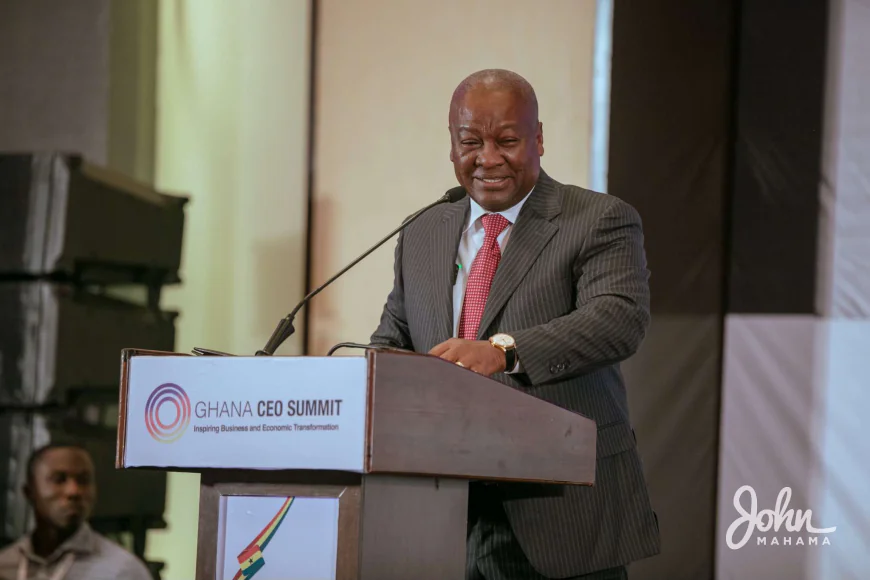President Mahama Unveils 8-Pillar Economic Strategy to Revive Ghana's Economy
President John Dramani Mahama outlines an 8-pillar plan to revive Ghana’s economy, focusing on fiscal discipline, local investment, export revitalization, and infrastructure development.

President John Dramani Mahama has announced an ambitious eight-pillar economic recovery strategy aimed at revitalizing Ghana’s economy, restoring market confidence, and promoting long-term sustainable development.
Speaking at the Ghana CEO Summit in Accra on Monday, May 26, 2025, Mahama detailed the core pillars of his government’s economic blueprint. The plan emphasizes fiscal discipline, strategic public investments, and export-led growth, alongside transparent governance and financial accountability.
1. Completing the IMF Programme with Discipline
President Mahama reaffirmed his administration’s commitment to fiscal discipline, especially in managing government borrowing and spending. He confirmed that Ghana is on track to complete the fourth review of the IMF Extended Credit Facility by June 2025, with an exit strategy set for 2026. A post-IMF policy support engagement will ensure financial responsibility is upheld.
2. Reopening Domestic and International Capital Markets
Mahama revealed plans to reopen both local and international capital markets in partnership with the IMF, Ghana Stock Exchange, and key banks. Future government borrowing will be tied to self-financing projects, ensuring loans are repaid through revenue generated.
3. Strengthening Sovereign Funds and Local Government Financing
To strengthen Ghana’s financial buffers, the administration will amend financial regulations to enforce mandatory contributions to Ghana’s sinking and stabilization funds. Local governments will also be empowered to issue infrastructure bonds to finance critical development projects like roads, schools, and water systems.
4. Clearing Verified Arrears and Rationalising Public Investments
A nationwide audit of government arrears is currently ongoing. Verified arrears will be cleared transparently, while new public investments will be prioritized based on necessity, available funding, and alignment with national development goals.
5. Accelerating Public Financial Management Reforms
Key financial management systems like the Treasury Single Account (TSA) and integrated tax administration will be reactivated. Real-time budgeting tools will help curb waste and eliminate corruption, creating a more transparent public financial system.
6. Revitalising Exports Through Ghana Exim Bank
The Ghana Exim Bank will be repositioned to support agro-processing, non-traditional exports, and light manufacturing. This move is intended to boost foreign exchange earnings, create jobs, and expand small and medium enterprises (SMEs).
7. Building Ghana into a Regional Hub for Trade and Investment
President Mahama’s vision includes transforming Ghana into West Africa’s leading commercial and investment hub. Priority sectors include port infrastructure, healthcare, digital services, education, and transport corridors, aimed at strengthening Ghana’s position within the African Continental Free Trade Area (AfCFTA).
8. Resuming Infrastructure Development to Stimulate Growth
Finally, Mahama emphasized the role of infrastructure development in national growth. Roads, energy systems, water access, housing, and urban renewal will be scaled up through public-private partnerships (PPPs) and the Big Push investment model.
Conclusion
President Mahama’s eight-pillar economic plan presents a holistic approach to transforming Ghana’s economy. With a focus on transparency, sustainability, and inclusive growth, this strategy is designed to restore fiscal stability, increase investor confidence, and unlock the potential of every region in Ghana.


